A leader’s primary responsibilities include building effective communication, motivating the team, and managing people. These leadership skills are directly connected to the leader’s emotional intelligence.
What is emotional intelligence, why is it important for management roles, and how can it be developed?

Understanding Emotional Intelligence: The Foundation of Leadership
Emotional intelligence (or Emotional Quotient, EQ) is the ability to recognize and understand not only your own emotions but also the emotions, intentions, and motivations of others. It also includes managing your emotions and influencing the emotions of others to reach different goals. EQ is a soft skill that is important not only in professional life but also plays a key role in personal relationships.
Psychologist and science journalist Daniel Goleman discusses this topic in detail in his book Emotional Intelligence. He explains that emotional intelligence is based on 12 core competencies, grouped into 4 key skills:
- Self-awareness
- Self-management
- Social awareness
- Relationship management
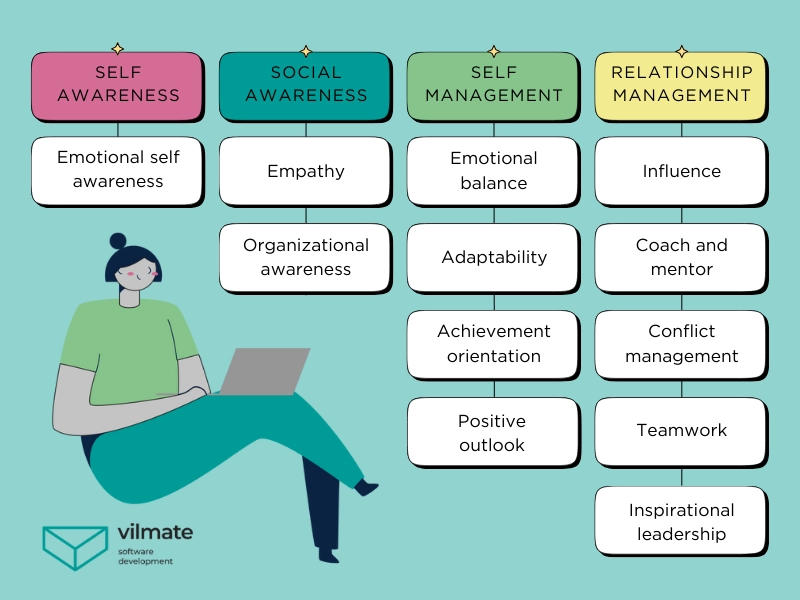
These components can be developed to varying degrees in different people. For example, a leader may be excellent at controlling their own emotions but lack the skills to influence their team. This is why it’s important to develop emotional intelligence in a well-rounded way—both in relation to oneself and to others.
EQ vs. IQ: Why Emotional Intelligence Matters More
In recent times, soft skills in IT have almost become more important than hard skills, especially during a crisis when there are more candidates than job openings. However, at Vilmate, we’ve always followed one golden rule: hire people who are comfortable to work with, and who feel comfortable working with us.
IQ (Intelligence Quotient) measures cognitive abilities—the capacity to analyze information, use imagination and logic, and work with numbers and words.
EQ (Emotional Quotient) reflects a person’s ability to manage emotions.
I believe that high emotional intelligence (EQ) significantly contributes to a person’s success both personally and professionally. While a high IQ is valuable, it alone does not ensure success; emotional intelligence plays a crucial role in navigating interpersonal relationships and achieving overall well-being.
We know many stories where inventions or discoveries were not appreciated at the time or were stolen by more resourceful individuals. Having a great idea is not enough—you also need to communicate it effectively.
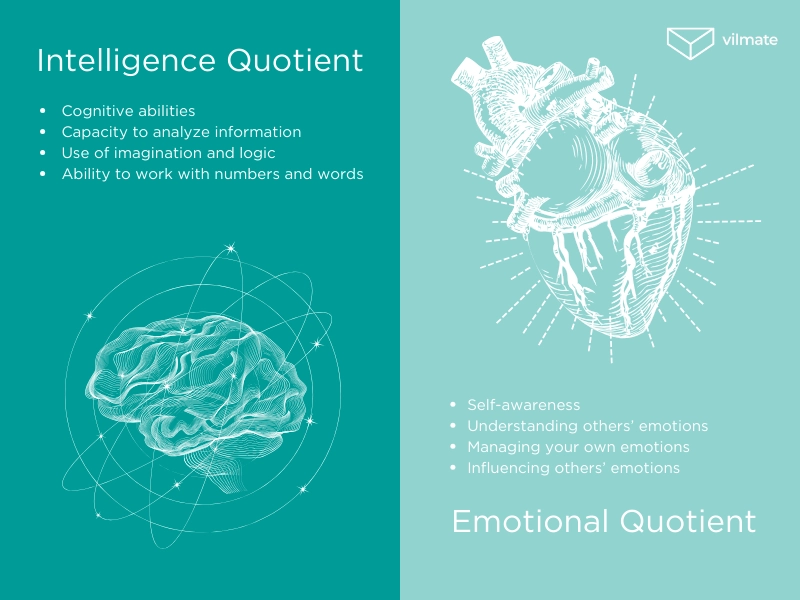
As people say these days, “the ability to sell yourself” is also a key aspect of EQ. The skill to understand what will appeal to a specific interviewer or manager and to find their key interests really impresses me. Learning to read people at that level is one of my long-term goals.
I’ve experienced situations where someone who performed brilliantly in an interview didn’t meet expectations during their probation period. However, such individuals often excel in connecting with clients and maintaining high levels of satisfaction, which can be a significant asset for the company.
Impact of Emotional Intelligence on Leadership Success
Developed emotional intelligence is crucial not only for leaders but for anyone working with people. A high EQ is essential for success in professional settings.
For managers, those with high EQ:
- Create emotional comfort in interactions with clients and team members
- Motivate employees more effectively
- Negotiate and find compromises better
- Predict people’s reactions to different situations
- Make more thoughtful and effective decisions
Emotions provide valuable insights. They are our body’s way of reacting to what’s happening around us. By understanding these emotions, we can better understand why we react in certain ways and make more informed decisions about how to handle different situations.
If a person cannot recognize and control their emotions, they also lose the ability to effectively influence those around them. For instance, a leader might ignore their intuition and make a risky decision, or they might misinterpret their employees’ motives and react inappropriately. These missteps can result in negative outcomes for the business.
Leaders with low emotional intelligence are often unaware of how others feel and may act without considering their impact. They might stick to one management style, such as only criticizing or, on the other hand, trying too hard to be a friend. In an authoritarian style, leaders may over-control or excessively focus on flaws, which can diminish employee motivation. This approach often leads to a formal work environment, high employee turnover, and decreased company profits.
Working with Clients
To prepare for client interactions, I use the following checklist:
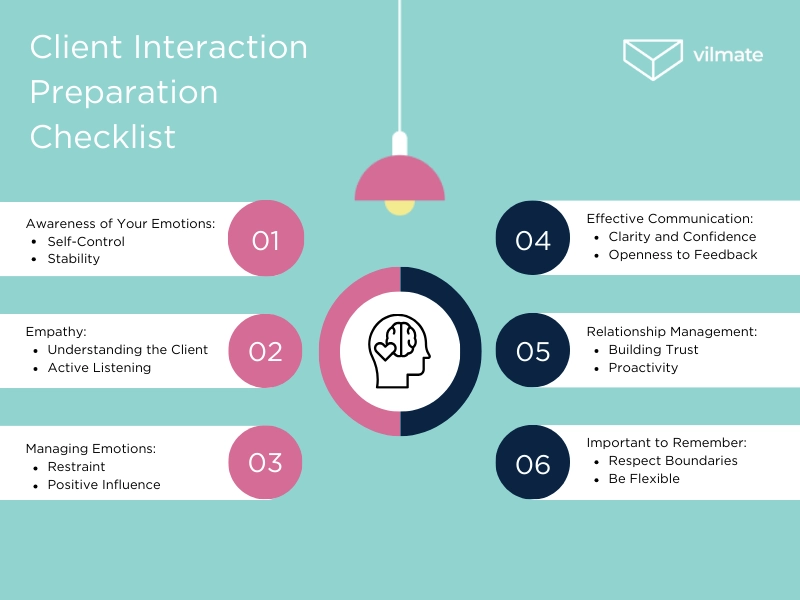
1. Awareness of Your Emotions
- Self-Control: Before starting a conversation with a client, make sure you are calm and composed. This helps avoid reactions driven by stress or fatigue.
- Stability: Try to stay emotionally steady, even if the conversation becomes difficult or tense. Clients can sense when you are confident and in control.
2. Empathy
- Understanding the Client: Aim to understand the client’s emotions and needs. Show empathy by acknowledging their situation and expressing your willingness to help.
- Active Listening: Listen carefully to the client and let them express their thoughts. By actively engaging with their perspective, you build trust and gain a clearer understanding of their expectations. This approach enables you to develop more tailored and effective solutions, ultimately improving client satisfaction and fostering a collaborative relationship.
3. Managing Emotions
- Restraint: In stressful situations, such as when a client is upset or concerned, stay calm and avoid reacting to provocations. Manage your responses to resolve the issue effectively.
- Positive Influence: Create a positive atmosphere during the conversation. Even in tough situations, try to highlight positive aspects or offer solutions that improve the client’s perception.
4. Effective Communication
- Clarity and Confidence: Communicate clearly and confidently so the client has no doubts about your professionalism. Explain complex technical details in simple terms.
- Openness to Feedback: Be ready to accept criticism and work on improvements. Clients appreciate when their feedback leads to real changes.
5. Relationship Management
- Building Trust: Focus on creating long-term relationships with clients. Address current issues while also fostering an atmosphere of mutual understanding and trust.
- Proactivity: Show initiative by offering new ideas and solutions that could benefit the client. By demonstrating a commitment to their success and not just fulfilling your job duties, you highlight your investment in their goals and add value to the relationship.
6. Important to Remember
- Respect Boundaries: Respect both your own and the client’s personal and professional boundaries.
- Be Flexible: Adapt to the client’s mood or preferences when necessary, but always maintain professionalism.
Working with Teams
A leader plays a crucial role in setting the emotional tone for the team. Employees follow the leader’s mood and attitude, and it is the leader’s job to inspire them and create an environment that boosts effectiveness.
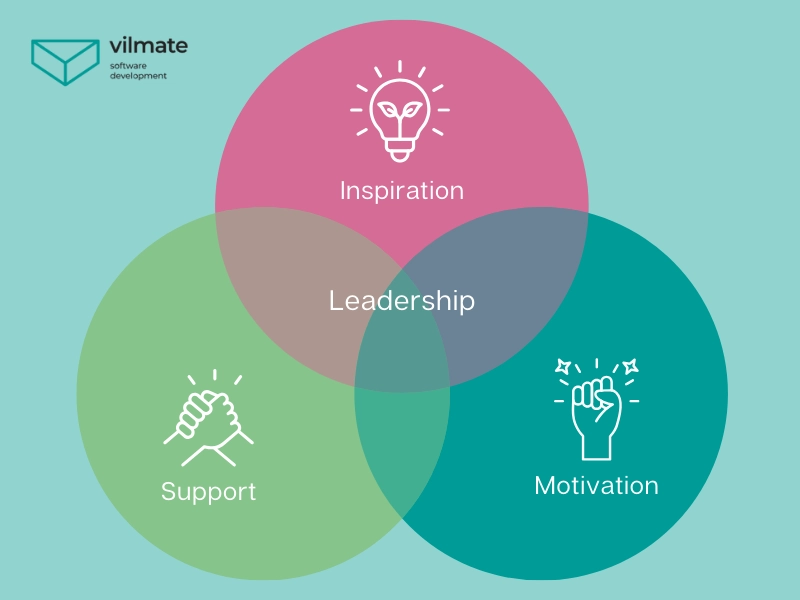
A leader with high emotional intelligence doesn’t have to maintain a constant atmosphere of joy and affection. For example, if a project is facing a tight deadline, the leader might need to push the team using different strategies — from explaining the negative consequences of missing the deadline to motivating the team to achieve their goals or even fostering a competitive drive.
The key trait of an emotionally competent leader is their conscious use of emotions. They can address serious issues or offer support with a smile, always with a clear purpose in mind. Such a leader is attentive to both their team and themselves.
How to Stay Energized and Avoid Burnout
Leaders experience many emotions each day, including negative ones. They often try to ignore these emotions, thinking they are managing them. However, this is just suppression, not true management.
Suppressed emotions don’t disappear. They can either harm your health or resurface at inconvenient times. Additionally, suppression can lower your overall emotional sensitivity, which might affect your interactions with people.
It’s crucial to avoid reaching a point of critical exhaustion, as recovering from it is much harder.
I like the analogy of holding a glass of water to explain stress and its effects. Consider this question: How much does the glass of water weigh? The amount of water doesn’t matter. What matters is how long you hold it. Holding it for a minute is fine. Holding it for an hour causes shoulder pain. Holding it all day makes your arm numb and paralyzed. The weight of the glass doesn’t change, but the longer you hold it, the heavier it feels.
So, remember to put the glass down.
To avoid emotional burnout, it’s important to listen to your feelings and use them to guide your decisions. Don’t be afraid to express your emotions, whether they are disappointment or joy, but do so with intention. Find a method that helps you recharge.
First, you need to learn to recognize your emotions. To understand what you’re feeling, answer these questions in a calm setting:
- What emotions am I experiencing?
- How strong are these emotions?
- What caused them?
- How are these feelings affecting me?
- Can I change how I feel, and should I?
Once you recognize your emotions, you can work on managing them. Determine what you want to achieve in the situation. For example, consider what outcome you want from a conversation with a client, or how to stop taking events too personally. Then, think about how to adjust your emotional responses or state.
There are different ways to manage emotions, and here are some that I use:
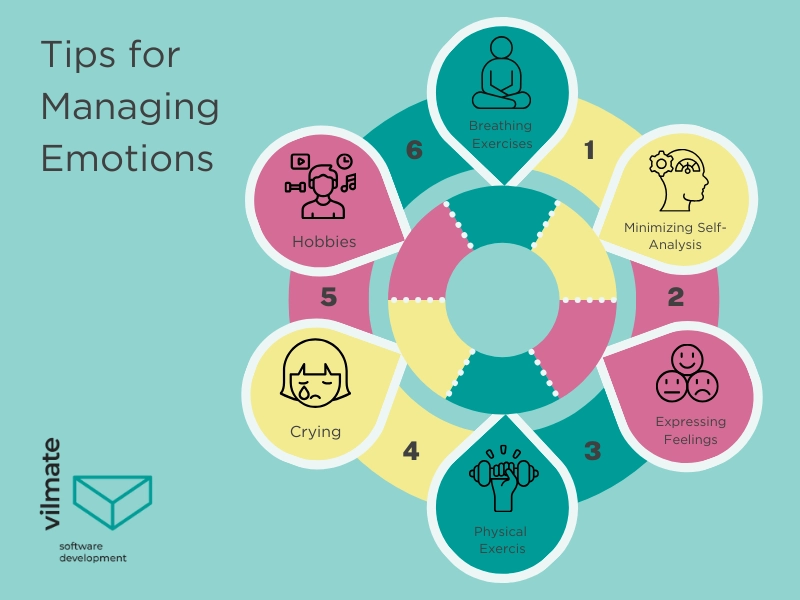
- Breathing Exercises: I find that deep and slow breathing helps me stay calm.
- Minimizing Self-Analysis: I don’t overthink my thoughts or actions that might cause stress. I treat past experiences as just that—experience.
- Expressing Feelings: I talk about my emotions and encourage others, especially men, to do the same without feeling embarrassed.
- Physical Exercise: This is essential. Even simple exercises help. I also enjoy walking, listening to music, and dancing.
- Crying: I believe crying is a great way to release emotions.
- Hobbies: I engage in activities like puzzles, drawing, and gardening.
I try to fill my life with positive experiences and maintain a balance between work and personal life. It’s not always easy, but I make an effort.
I hope my tips and advice are helpful for you and your team. For even more great insights, feel free to check out the articles on the Vilmate's blog.




